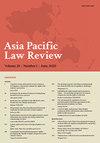Whose data is it anyway? An empirical analysis of online contracting for personal information in China
IF 1.7
4区 社会学
Q2 LAW
引用次数: 1
Abstract
ABSTRACT China’s data governance has garnered global attention. An important part of data governance is the protection of personal data. Many believe that the newly issued Personal Information Protection Law (PIPL) can improve the protection of personal information in China. However, the merits of this specialized law rest in part on empirical exams. This paper explores whether the PIPL can solve the issues existing in online contracting for personal information in China. It firstly introduces provisions related to contracting for personal information before the promulgation of the PIPL. It then identifies three critical issues regarding online contracting for personal information in China after reviewing 202 online peer-to-peer lending platforms’ terms of service and privacy policies. These issues include privacy policies that are not readily accessible, the substantial variation between terms of service and privacy policies pertaining to personal information collection, processing, sharing, and protection, and the bias of contractual terms. The paper further discusses whether the PIPL can help address three issues considered in the survey results. It argues that, even though the new law looks promising and may help address some of the issues in online contracting for personal information, its effectiveness ultimately depends on its enforcement and consumers’ reaction to changes in the way firms contract for personal information. Therefore, this paper also calls for more empirical studies on China’s personal information protection.这到底是谁的数据?中国网络个人信息承包的实证分析
中国的数据治理受到了全球的关注。数据治理的一个重要部分是保护个人数据。许多人认为,新颁布的《个人信息保护法》(PIPL)可以改善中国对个人信息的保护。然而,这一专门法律的优点部分取决于实证检验。本文探讨了PIPL是否能够解决中国个人信息网络承包存在的问题。首先介绍了《个人信息保护法》颁布前有关个人信息承包的规定。在审查了202个在线p2p借贷平台的服务条款和隐私政策后,报告指出了中国在线个人信息合同的三个关键问题。这些问题包括不易获取的隐私政策,与个人信息收集、处理、共享和保护有关的服务条款和隐私政策之间的实质性差异,以及合同条款的偏见。本文进一步讨论了PIPL是否有助于解决调查结果中考虑的三个问题。它认为,尽管新法看起来很有希望,可能有助于解决个人信息在线合同中的一些问题,但它的有效性最终取决于它的执行和消费者对公司个人信息合同方式变化的反应。因此,本文也呼吁对中国的个人信息保护进行更多的实证研究。
本文章由计算机程序翻译,如有差异,请以英文原文为准。
求助全文
约1分钟内获得全文
求助全文

 求助内容:
求助内容: 应助结果提醒方式:
应助结果提醒方式:


